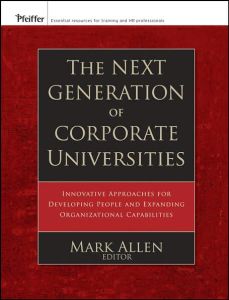Join getAbstract to access the summary!

Join getAbstract to access the summary!
Mark Allen
The Next Generation of Corporate Universities
Innovative Approaches for Developing People and Expanding Organizational Capabilities
Pfeiffer, 2007
What's inside?
How corporate universities can go beyond training to deliver leadership development, culture change and wisdom management.
Recommendation
Corporate universities have an identity problem. Many serve nonbusiness-related organizations, and so aren’t exactly corporate. None fit the profile of ordinary academic universities. But other than those small inconsistencies, they are doing just fine. In 1993, some 400 corporate universities were in operation. By 2001, this grew to 2,000. The real corporate university is more than a training department on steroids. Its mission is developing its organization’s next generation of leaders, shaping corporate culture and changing employee behavior. Famous examples include McDonald’s Hamburger University in Illinois, and Disney’s universities in Florida and California. Some corporate universities are quite large. The Defense Acquisitions University at the U.S. Department of Defense employs 550 faculty and staff members. Caterpillar, Inc.’s university has 100 staff members. Expert Mark Allen and other essay writers provide valuable, if jargon-burdened, advice on organizing and administering modern corporate universities. Allen planned this book for chief learning officers, corporate-university professionals, and training and instruction design professionals. GE’s Jack Welch and McDonald’s Ray Kroc saw the corporate university as the ideal way to develop employees, instill loyalty and improve productivity. If those are your goals as well, getAbstract recommends this informative book.
Summary
About the Author
Mark Allen, Ph.D., author, consultant and speaker, is an international authority on corporate universities and nontraditional higher education.

















Comment on this summary